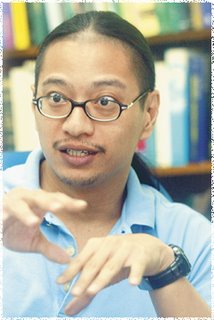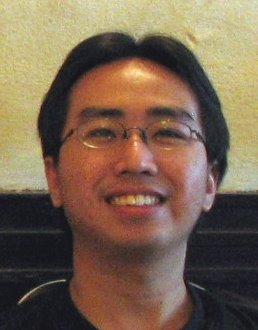Lecturer also kena? Biasalah...
I think many people in the English-speaking circle know Azmi Sharom very well. Dr. Azmi is the former deputy dean of the UM Law faculty. He is very vocal in issues of academic freedom and campus democracy. He writes prolifically in English dailies.
I was told that Azmi received a show cause letter from the university, after the below piece was published in The Star. What do you think about UM's ranking in Times next year?

STUDENT politics bores me. Nothing can be more soul-numbing than a bunch of young people whining about the poor food in their colleges or the lack of parking spaces for the cars that daddy bought them.
My interest in student elections is therefore not based on the issues but on the process itself. This interest arises out of my dual role as a lawyer and as an educator.
Let’s take the first role: the lawyer. Lawyers are often the brunt of unflattering jokes and usually we tell the best ones. But amidst the snide comments about our shark-like tendencies, it is forgotten that at the core of our values should be justice and fairness. If we don’t have these ideals, then really, what’s the point of being a lawyer?
In the interest of fairness and justice then, it is important to make sure that things are run in a manner that reflects these two ideals. In this sense, I do not think that the way student elections are conducted on our public university campuses pass muster. Let’s begin by looking at the less contentious points first.
The rules in place with regard to campaigning are really laughable. There are banners and posters put up here and there but they say absolutely nothing except the name of the candidate. There is no mention of their policy grounds and their campaign promises. This is made worse by the fact that the candidates are given about a day to campaign! Add to this the ban on the creation of formal coalitions, and what you get are voters who have little opportunity to know who they are voting for. It makes a mockery of the idea of a true democracy.
Why the crazy rules? There has been since the 70s a fear on the part of the Government that students are a political force to be reckoned with. This was why the draconian University and University Colleges Act (UUCA) was passed; to neuter this force. In the late 1990s, in the fervour of reformasi, again student bodies were at the forefront calling for political change.
In the light of all this, efforts have been made to make sure that university elections cannot reflect in any way real politics. That is why the system is set up to be so utterly sterile and insipid. As though it is not bad enough that the UUCA prevents students from having any sort of political party allegiances, their campus politics are emasculated to such an extent that it becomes near impossible to reflect any sort of political views.
Now we get to the contentious issues. Not content with stifling the entire election process, university authorities then decide to get actively involved by clearly supporting one group of student candidates over another. The group of choice is known as the Aspirasi group. All sorts of lavish treatment are given to this group, and its candidates are seen very much as the university’s candidates of choice.
Certain activities which can be seen to be in contravention of the UUCA like the Selangor state government’s treating Aspirasi candidates to a stay in a luxury hotel in Petaling Jaya prior to the elections this year, go unquestioned.
It’s rather funny that students would align themselves with the university authorities when really they should be aligning themselves with the student body, but never mind, different strokes for different folks. The problem here is that this sort of cosiness breeds a mentality that somehow the Aspirasi members are a sort of semi-university authority.
I argue that that is why the student representatives of a public university who abused fellow students for merely setting up a help desk behaved in that way. They obviously thought that their thuggish behaviour was being done on behalf of their university. The fact that they did not get even the mildest slap on the wrist seems to show that the university too believes this.
What is worse are the accusations, so far not properly investigated, that university authorities and Aspirasi candidates actually threaten students with expulsion from residential colleges if they do not vote for Aspirasi.
Things also take a fishy turn when votes are marked in such a way as to be traceable back to the voter, and electronic voting, as conducted in some universities, cannot be scrutinised.
Speaking of scrutiny, I wonder why a recent delegation of Aspirasi members begged the Government not to allow Suhakam to monitor student elections. I have always thought that if you have nothing to hide, it matters not if you are being scrutinised. Obviously, I’m mistaken.
This practice of favouring one camp over the other is not limited to election time either. Worrying reports from students suggest that for ordinary student projects, Student Affairs will be more helpful if the project members were Aspirasi supporters. If this is true, and please note I am not saying it is, then what we have here is full-scale corruption.
It is imperative that all universities are thoroughly investigated by a neutral third party to come to the truth. Are student elections being conducted in a manner that is as constitutional and as democratic as possible? Are allegations of Student Affairs’ unethical involvement in student politics and everyday student activities true?
If these allegations are true, they must be put to a stop. If they are not true, let it be shown by a neutral third party that they are not true.
Although not completely definitive, an occurrence during the last student elections is worrying and is further reason why a proper investigation should be conducted. What happened was that the voting for two faculty representatives had to be done again because the number of votes was more than the number of voters. The original vote was done at the various colleges. The re-election was done at the Faculty concerned.
In the first vote, an Aspirasi candidate came first, narrowly followed by an independent candidate. In the re-election, the two independent candidates won by a margin far larger that the original vote.
What this shows are two possibilities. Either the original votes were tampered with or that students voted differently when the venue for the election was a neutral one. (Colleges have a reputation of being very pro-Aspirasi.)
As an educator, I pray that these allegations can be proven to be categorically untrue. Because if they are true, then what are we teaching our young people? That it is OK to have an electoral system that favours one group over all else? That it is OK to use one’s power to behave in an unethical manner so that one can win?
If these are the lessons being imparted – and remember they are being imparted to the future leaders of a nation that is supposedly a democracy –then God help us all. Because a nation led on cynical Machiavellian pragmatism and not the ideals of democracy and fair play would be a poor nation indeed.




2 Comments:
201510.20dongdong
michael kors outlet
mont blanc pens
ugg boots
coach outlet online
Authentic Louis Vuitton Handbags Outlet Sale
ugg boots
true religion jeans
Montblanc Pen Refills Outlet
Abercrombie & Kent Luxury Travel
Michael Kors Handbags Clearance Outlet
Cheap Michael Kors Handbags Outlet
Designer Louis Vuitton Handbags Outlet
louis vuitton outlet stores
burberry outlet
canada goose jackets
michael kors outlet online
hollister uk sale
Air Jordan 6 Champagne Bottle
100% Authentic New Lerbron James Shoes
coach outlet
michael kors bags
Louis vuitton Official Website Outlet Online
michael kors outlet
tory burch sale
Michael Kors Outlet Sale Handbags Discount
Christian Louboutin Outlet Sale Cheap Online
coach outlet
cheap jordans,jordan shoes,cheap jordan shoes
Authentic Air Jordan 13 shoes for sale
cheap uggs
mihchael kors bag
michael kors handbags
Michael Kors Handbags Clearance Outlet
Canada Goose Outlet Online
louis vuitton outlet online
I definitely love this site.
http://sites.google.com
https://www.blogger.com/blogger.g?blogID=7421661549272645002#allposts
https://www.prokr.net/ksa/jeddah-tanks-isolation/
https://www.prokr.net/ksa/jeddah-water-leaks-detection-isolate-companies/
Post a Comment
<< Home